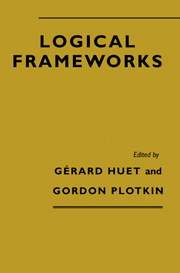Book contents
Inductive sets and families in Martin-Löf's type theory and their set-theoretic semantics
from Type Theory
Published online by Cambridge University Press: 04 August 2010
Summary
Abstract
Martin-Löf's type theory is presented in several steps. The kernel is a dependently typed λ-calculus. Then there are schemata for inductive sets and families of sets and for primitive recursive functions and families of functions. Finally, there are set formers (generic polymorphism) and universes. At each step syntax, inference rules, and set-theoretic semantics are given.
Introduction
Usually Martin-Löf's type theory is presented as a closed system with rules for a fixed collection of set formers including Π, ∑, +, Eq, Nn, N, W, and Un. But it is often pointed out that the system is in principle open to extension: we may introduce new sets when there is a need for them. The principle is that a set is by definition inductively generated – it is defined by its introduction rules, which are rules for generating its elem ents. The elimination rule is determined by the introduction rules and expresses definition by primitive recursion on the way the elements of the set are generated. (Normally the term primitive recursive refers to number-theoretic functions. But it makes sense to use this term generally for the kind of recursion you have in Martin-Löf's type theory, since it is recursion on the way the elements of a set are generated. This includes primitive recursive functionals and transfinite recursion on well-orderings. An alternative term would be structural recursion in analogy with structural induction.)
Backhouse et.al. exhibited a schema for inductive sets which delimits a class of definitions admissible in Martin-Löf's type theory, which includes all the standard operations for forming small sets except the equality set.
- Type
- Chapter
- Information
- Logical Frameworks , pp. 280 - 306Publisher: Cambridge University PressPrint publication year: 1991
- 41
- Cited by



